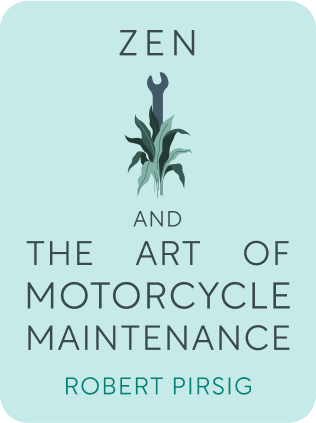

This article is an excerpt from the Shortform book guide to "Zen And The Art Of Motorcycle Maintenance" by Robert Pirsig. Shortform has the world's best summaries and analyses of books you should be reading.
Like this article? Sign up for a free trial here .
Who is Chris Pirsig and what is his role in Zen and the Art of Motorcycle Maintenance?
Robert Pirsig’s son, Chris Pirsig, is also a prominent character in his father’s book Zen and the Art of Motorcycle Maintenance. At the time of the novel, Chris is 11 years old and is struggling with his health.
Read more about Chris Pirsig in Zen and the Art of Motorcycle Maintenance.
Chris Pirsig: Robert Pirsig’s Son
When the book begins, Robert and Chris have just left Minneapolis on motorcycles. They are accompanied by John and Sylvia Sutherland, friends of Pirsig, who are riding with the Pirsigs as far as Bozeman, Montana. Whereas Robert is an editor of technical manuals, John is a drummer, and their differing attitudes toward motorcycle maintenance provide the impetus for Pirsig’s early Chautauquas on technology.
Chris Pirsig has been causing trouble at home lately. He also suffers from chronic stomach aches, but no doctor has been able to find a physical cause. His caretakers fear he’s at risk of a breakdown as well.
In Bozeman, the group stays with an old colleague of Phaedrus named DeWeese. After a few days, the Sutherlands return to Minnesota, and the Pirsigs press on to California. As they near their destination, Pirsig fears that Phaedrus is reviving in his mind and another breakdown is imminent.
When the Pirsigs reach California, Chris’s mood is at its nadir. Pirsig feels compelled to have a frank talk with him. He tells Chris that he, Pirsig, was once insane, and that the doctors fear Chris will end up insane as well. (Shortform note: The terminology and overall depiction of mental disorders in the book is dated.) In response, Chris descends into a wailing fit. As Chris rocks and cries, Phaedrus speaks through Pirsig, and Chris responds favorably. When Chris asks if Robert was really insane, Phaedrus, through Pirsig, says no. Chris Pirsig suddenly brightens, and the book ends with the Pirsigs cruising along the Pacific coast, reconciled.
Eventually Phaedrus confined himself to a bedroom in his apartment. He told his wife he wanted to separate and spent days on end sitting cross-legged on the floor, staring at the wall. During this time, he allowed cigarettes to burn down to his fingers and he urinated on the floor. When his wife discovered these symptoms, she called for help. But it was too late: Phaedrus’s consciousness had completely disintegrated.
It’s pitch black out, and the rain is coming down hard; the cycle’s headlight barely reaches the road. Pirsig regrets having ridden on from Arcata. They pull off the freeway onto a dangerous gravel road, and Pirsig has to slow down to keep them upright. They come upon a gas station and use its phone to make a motel reservation.
The room is depressing, but it’s dry and warm. Pirsig and Chris sit in front of the heater, and Chris asks when they’re going home. He’s upset that all they do is ride around without a clear destination. He says that he liked being with Pirsig more when he was little. Soon, he’s crying and rocking back and forth in a way that concerns Pirsig—it reminds him of something he saw in the hospital when he was Phaedrus.
Later, when they’re in their beds, Pirsig asks Chris if things were better when they were in Chicago. Chris replies that they were, that Pirsig used to play games with him. It becomes clear to Pirsig that Chris has mistaken Phaedrus’s mental decline: Chris thinks Phaedrus was just pretending to be confused. Chris keeps saying Pirsig doesn’t do anything anymore.
In the morning Pirsig is up first. Chris is in a terrible mood—surly and silent. After breakfast, they ride into a heavy fog and the temperature drops, and when the fog lifts, they’re on a cliff and can see the ocean. They pull over to put on warm-weather gear. As Pirsig gets into his jacket, he sees Chris get much too close to the cliff’s edge. When he yells, Chris doesn’t answer. He rushes over and pulls Chris back by his shirt.
Then Chris refuses to put on his layers. Pirsig tries to wait him out. Eventually Chris says he wants to “go back.” Pirsig explains it’s too far, but Chris persists, causing Pirsig to lose his temper. Chris relents and they continue riding south. Pirsig admits that, for all the suggestions he’s made to eliminate the division between subject and object, he hasn’t confronted the division between him and his son.
The riders reach Mendocino County. The surroundings are lush and open. The road descends from a cliff to a beach, where Pirsig pulls over to rest. Chris wants to press on—he’s still upset from the morning—but Pirsig ignores him and explores the beach. Back on the cycle, Pirsig realizes that Chris is like Phaedrus—full of questions, stubborn, itching for a fight.
They arrive in a town that’s covered in haze, giving everything a nostalgic aura. They go to a restaurant, but Chris says he isn’t hungry—his stomach hurts. Pirsig proceeds to order lunch for himself and eat; presently he realizes Chris is crying. Chris says he’s sorry he came on the trip, that it isn’t fun and he hates everything. It’s then that Pirsig confesses to Chris that he’s been thinking of putting him on a bus home once they get to San Francisco.
To Pirsig’s surprise, Chris gets even more upset. He doesn’t want to stay with any of the people Pirsig names—Robert reveals that guests are currently staying at their house—and breaks down in tears again. Pirsig suggests they go for a walk. They end up back on the cycle, looking for a peaceful place to chat. The road takes them to an ocean overlook, but, at the moment, fog obscures the water.
They sit, and Pirsig confesses to Chris that he was once insane and is moving in that direction again. He says that he’s sending Chris home because he’s not sure he can take care of him anymore. He also tells Chris that the doctors fear Chris may also be troubled—that his stomach aches are psychosomatic, and that his misbehavior at home has worried all of the authority figures around him except Pirsig. In response to this, Chris lets out a terrible wail and falls to the ground in the fetal position. Pirsig screams at him to get up, but he won’t listen.
And then, suddenly, he does listen. A voice—Phaedrus’s—has spoken through Robert and told Chris that he hasn’t forgotten him and that they’ll be together now. Chris sits up and allows Pirsig to put his jacket around him. Through Chris’s questions, it’s revealed that Pirsig’s recurring dream with the glass door actually happened—the glass door was in the hospital, and it was, in fact, the last time Phaedrus saw his family before his personality was erased.
The fog lifts, and the riders put on their helmets to mount the cycle. Chris, who’s starting to come around, asks Pirsig if he really was insane. Pirsig/Phaedrus denies it, and Chris says he knew it all along.
They ride along the coast, the landscape full of flowers and the air perfumed. Pirsig begins to feel sleepy and stops at a turnoff with a picnic table. They take a nap, and when they wake, they stow their jackets and helmets and ride without them. As they bank into the road’s turns, Chris stands on the foot pegs behind Pirsig. He exclaims at the beauty of their surroundings; he says that before he wasn’t able to see over Pirsig’s shoulders.
Then he asks if he can get a motorcycle when he grows up. Pirsig consents, but only if Chris Pirsig agrees to take care of it. When Chris asks if it’s hard to maintain a motorcycle, Robert replies that, whereas repairing the motorcycle isn’t so hard, having the right attitudes is. When Chris asks whether he’ll have the right attitudes when he grows up, Pirsig tells him he has no doubt he will.
Robert Pirsig’s son, Chris Pirsig, plays an important role in the story as Pirsig imparts and learns many life lessons.

———End of Preview———
Like what you just read? Read the rest of the world's best book summary and analysis of Robert Pirsig's "Zen And The Art Of Motorcycle Maintenance" at Shortform .
Here's what you'll find in our full Zen And The Art Of Motorcycle Maintenance summary :
- How an unnamed narrator and his son are on a cross-country motorcycle journey
- Why technology can be creative
- How to focus on what's in front of you in order to get exactly what you need






